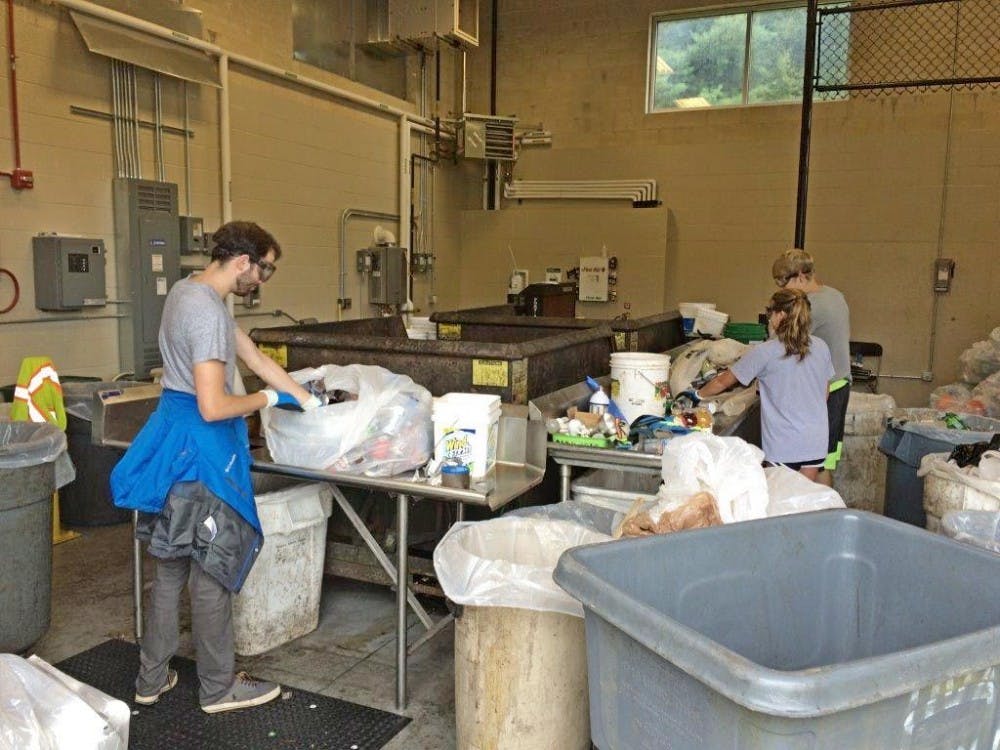Each year, thousands of University students occupy both on- and off-Grounds housing options. From morning K-cups to lunchtime to-go boxes and plastic water bottles to endless Amazon package deliveries, trash builds up quickly. When it comes to certain days like move-in and move-out, dumpsters are constantly reaching their maximum capacity. To keep the endless disposals of the University at bay, University staff such as Nina Morris, sustainability outreach and engagement manager, and Sonny Beale, recycling superintendent for the University Academic and Health Systems, work behind the scenes to keep the University environmentally focused. For off-Grounds residents, recycling options are not as available.
The University currently recycles aluminum and other metals, cardboard, electronics, glass of all colors, various plastics and white and mixed office paper, as well as E-cycling items such as batteries. In order to separate the products, the University has decided to steer away from single-stream recycling — in which all trash is combined and sent out in collection trucks together — and instead separates it themselves. The reason behind this lies in the importance of cleanliness of the recyclables to ensure their re-use.
“We are fortunate to have an amazing team within Facilities Management that collects and hand-sorts U.Va.’s recycling to help make sure the recycling we collect is high quality and can be turned back into usable products,” Morris said. “It’s important that all recyclables are rinsed and properly sorted so we can ensure materials are truly recycled.”
According to reports from material recovery facilities, contamination due to commingling of recyclables, also known as single-stream recycling, is what many times sends materials straight to the landfill. Sonoco Recycling, the University’s contracted vendor for collecting recyclables, is more able to convert materials into new products when there is little contamination, such as broken glass or wet paper. This is important when it comes down to how much trash the University community puts out.
Each month, the University as a whole produces 34 to 36 bales of recycling measuring 30 inches by 36 inches by 60 inches in size. Once filled with recyclables, these bales are sent out to separate facilities. Aluminum bales weigh 350 pounds each, plastic bales weigh 750 pounds and steel can bales weigh 900 pounds. In addition, two tons of cardboard is collected around Grounds each day.
For those not living on-Grounds, recycling throughout off-Grounds is not as centralized, due to the fact that apartments and houses are owned by many different companies. According to CBS Rentals, a popular off-Grounds housing company, recycling is not available to residents. Beale claims that recycling for companies is getting harder due to today’s current economy.
According to Beale, the issue hindering the recycling process is due to the fact that the market value of recyclables has been on a continuous decline. For many companies, the cost of collecting and processing recyclables outweighs the money they receive in return from recycling collectors.
“If you're willing to pay a couple bucks extra a month, [rental companies] have no reason to say no,” Beale said. “A lot of students are very questionable about why their apartment isn’t recycling, and I don't think many people think about what it costs.”
Second-year Kaylie Puccinelli has lived in Dovecote, a CBS rental property, since August.
“I think CBS gives us the option to recycle cardboard, but besides that there are not any other recycling options,” Puccinelli said. “It is frustrating because there is nowhere off-Grounds to recycle, and I wish there were more options.”
According to a past Cavalier Daily article, Recycling on vs. off Grounds: What’s the Difference?, students living in non-recycling apartments have the option to sign up for free recycling through the City of Charlottesville, though lack of curb space makes this difficult.
Since Beale has been working at the University, the University’s recycling team has won 19 awards, both locally and nationally. Though great strides towards a greener Grounds have been made, Beale and Morris both believe that much improvement can still be made in educating the University community about what and how to recycle.
“The more U.Va. departments and our community understand the importance of recycling and how and where to recycle, the less U.Va. will send to the landfill,” Morris said.
Despite his belief that greater awareness is needed throughout the community, Beale has seen major improvements throughout his years in the recycling department.
“In the past 10 years, I've seen a major increase of awareness and people wanting to do the right thing,” Beale said. “Over the past five years, that has increased at least twice.”
The idea of repurposing materials is something that Beale wishes more people throughout not only the University and Charlottesville need to start paying more attention to but also the world.
“We're capturing the materials before they go to landfill, but we should be focusing more on slowing down the purchase,” Beale said. “Society in general is so consumerized and commercialized. The first time something comes out new, people have to go run out and buy it, and then they've got this still good product that they have to find a new home for.”
To lessen the University’s carbon footprint, Beale and his team have implemented the ROSE Program, which collects never used or gently used office supplies and makes them available to the community. This program is based out of the University’s recycling office on Leake Drive and is open to the Charlottesville community in addition to the University. With this program, and by promoting the UVA ReUSE store — which collects and sells University-owned surplus property — Beale aims to minimize the presence of useful supplies in landfills.
“More and more people are really thinking about our environment or thinking about the economic benefits of not landfilling materials, and how things can be repurposed,” Beale said.
Correction: A previous version of this article incorrectly stated that Beale implemented the ReUSE Store. Beale did not start this initiative, and the article has been updated with the correct information.







